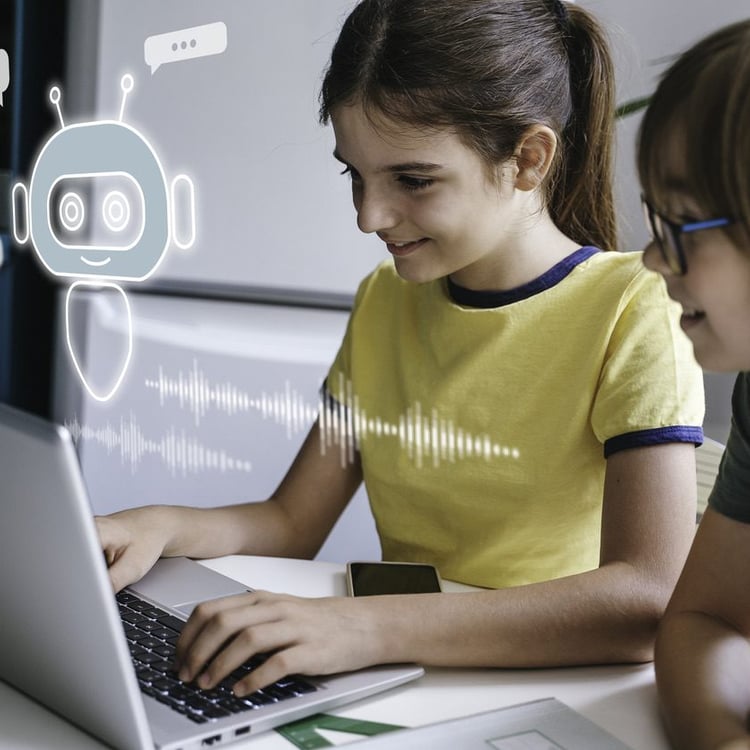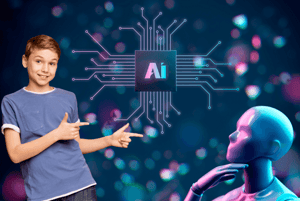Are you wondering how to prepare your child for the future in a world driven by rapid technological advancements? You’ve probably heard the buzz around Artificial Intelligence (AI) and how it’s reshaping industries, jobs, and even daily life. But how does this impact your child, and why should you care about teaching them AI skills now?
This article will explore why AI education isn’t just a passing trend but a key to unlocking your child’s future success. We’ll discuss how AI is changing society, why starting early matters, and the practical steps you can take to introduce your child to AI concepts. By the end, you’ll have a clear understanding of how AI can empower your child with skills that will be essential in 2025 and beyond.
Table of Contents
The Growing Role of AI in Society

Artificial Intelligence is no longer a concept of the future—it’s already here, influencing nearly every aspect of our lives. From the way we communicate to how industries function, AI is at the core of these transformations. But what does that mean for your child? Simply put, AI will shape the world they grow up in. Whether it’s virtual assistants like Alexa, AI-powered recommendations on YouTube, or autonomous cars, AI is part of their everyday experiences.
AI’s growing role in healthcare, finance, education, and even entertainment means that understanding how it works will be crucial for tomorrow’s leaders and innovators. Kids who learn AI concepts now will have an edge, as they’ll be better equipped to navigate and shape the AI-driven world. It’s not just about programming or math—it’s about understanding problem-solving, creativity, and the ethical implications of technology. The earlier we prepare kids for this shift, the more adaptable and successful they’ll be in their future careers.
Why Start AI Education Early?

Introducing AI concepts to kids as early as possible can provide numerous benefits. First, children are naturally curious, and their brains are primed to absorb new information quickly. Starting early taps into their natural inclination to explore, helping them view AI as an exciting tool rather than something complex or intimidating.
Another major reason to begin early is that foundational AI skills overlap with other key subjects like math, logic, and creative problem-solving. These skills help children develop critical thinking and an ability to approach challenges from multiple angles. Imagine how empowering it can be for your child to understand not only how technology works but also how to control it and even create it.
Here’s why early AI education makes sense:
- Curiosity and learning capacity: Young minds are open and eager to learn, making them perfect candidates for early exposure to AI concepts.
- Cross-disciplinary benefits: AI involves math, logic, and creativity, boosting their overall cognitive skills.
- Preparedness for future careers: AI will dominate many industries in the future, giving early learners a head start.
By giving your child the tools to understand AI early, you’re setting them up to be not just consumers of technology, but creators and innovators in their own right.
Related Read: Top 10 Affordable AI Robots to Teach Kids Coding and AI
AI Education as a Foundation for Future Careers
In a world where automation and AI are becoming deeply integrated into industries, the future job market will demand a whole new set of skills. By 2025, experts predict that AI will play a critical role in sectors ranging from healthcare to entertainment. For children, understanding AI concepts now will not only open doors to high-tech careers but also provide a competitive edge in any field.
AI education doesn’t just prepare kids to work in tech-related jobs. It teaches them problem-solving, logical reasoning, and creative thinking—skills that are relevant across various disciplines. Whether your child dreams of being a data scientist, a medical professional using AI-powered diagnostics, or an entrepreneur launching AI-driven startups, early exposure to AI will be a strong foundation for future career success. Moreover, it fosters a mindset of adaptability, helping them stay on top of emerging technologies and changes in their chosen fields.
This foundational knowledge will be especially important as AI automates routine tasks, leaving the workforce to focus on creativity, strategic thinking, and innovation. Those who understand how AI functions will be positioned to lead and shape its applications in the workplace, making them valuable assets in any industry.
AI Learning Tools for Kids

Teaching AI to kids doesn’t need to be overwhelming. In fact, there are several user-friendly, engaging platforms available that introduce AI concepts through hands-on learning and creative projects. These tools break down complex ideas into bite-sized lessons that are accessible even for younger learners, making AI education both fun and approachable.
Here are some effective AI learning tools designed for kids:
- Scratch with AI Extensions: Scratch is a popular block-based programming platform where children can build games, animations, and stories. The introduction of AI extensions allows kids to incorporate AI-driven elements, like speech recognition, into their projects, making learning interactive.
- Google’s AI Experiments: Google offers a range of playful experiments that let kids experiment with AI through visual and audio-based projects. This allows them to get a feel for how AI interprets patterns and data.
- CodaKid’s AI Courses: CodaKid’s curriculum provides structured courses where kids can learn AI through coding projects. These courses are designed for various age groups and help kids understand core AI concepts while building real, working programs.
These tools help children grasp AI principles through play, creativity, and experimentation. Not only do they make learning AI fun, but they also help demystify complex topics, building confidence and curiosity. By incorporating these platforms into a child’s learning journey, parents can spark an interest in AI and help foster future-ready skills from an early age.
Related Read: Interactive AI Learning Tools for Kids: Apps and Platforms to Get Started
Challenges in AI Education and How to Overcome Them
While the benefits of introducing AI to kids are clear, there are still challenges that parents and educators face when integrating AI education into learning routines. One of the biggest hurdles is the complexity of AI concepts. Machine learning, neural networks, and data science might seem too advanced or abstract for young learners, leaving parents feeling overwhelmed or unsure of where to start.
Another challenge is the accessibility of resources. Not all schools have the tools, technology, or trained staff to teach AI effectively. This can create a learning gap for students in underfunded or underserved communities, where access to high-quality STEM education may be limited.
However, these challenges can be overcome with the right approach and resources:
- Simplifying AI concepts: Start small. Instead of jumping into advanced topics, focus on introducing basic ideas such as pattern recognition, problem-solving, and logic. Visual and interactive tools, like Scratch or CodaKid, are excellent ways to simplify AI for young minds.
- Self-paced online learning: If formal education systems are lacking AI courses, there are plenty of online platforms that offer self-paced learning opportunities. Parents can support their kids by exploring these together and selecting age-appropriate materials.
- Encouraging curiosity: AI education doesn’t have to be rigid. Encourage your child’s natural curiosity and let them experiment with tools and projects. This makes learning feel less like work and more like an exploration.
By tackling these challenges with creative solutions, you can ensure that your child isn’t left behind as AI becomes more prominent in education and the workforce.
Ethics and Responsibility in AI Education

As we introduce children to AI, it’s equally important to teach them about the ethical implications and responsibilities that come with this powerful technology. AI has the potential to influence many aspects of society, from privacy and data use to job automation and decision-making. Children need to understand not only how to create AI but also the importance of using it responsibly.
One ethical concern is bias in AI algorithms. Since AI systems learn from data, they can sometimes reflect the biases present in that data. It’s crucial for kids to learn how to recognize and mitigate such biases, ensuring that their creations are fair and inclusive. Discussions about fairness, transparency, and accountability should be part of the AI education journey.
Additionally, children should be aware of privacy issues. With AI systems often relying on personal data, teaching kids about the importance of data privacy and ethical data usage is critical. They need to understand that while AI can provide many benefits, it must be handled with care to avoid misuse or harm.
By incorporating lessons on ethics into AI education, we can ensure that the next generation of AI developers and users are not only skilled but also responsible, thoughtful innovators.
Related Read: ChatGPT for Kids: Safe and Fun Ways to Explore AI
The Future of AI in Education and Beyond
The future of AI in education looks incredibly promising. AI is not only a subject to be learned but also a tool that can enhance the way children learn other subjects. Adaptive learning platforms powered by AI can tailor educational experiences to each student’s unique pace and style, offering personalized feedback and recommendations. This personalized approach can make learning more efficient and enjoyable for kids, helping them excel in areas where they need the most support.
Beyond the classroom, AI will continue to shape industries, automate tasks, and drive innovation. Children who learn about AI today will be the ones designing the intelligent systems of tomorrow—whether it’s creating new healthcare solutions, advancing environmental technologies, or even developing AI tools to support education itself.
In this AI-driven future, the ability to understand and work with AI will no longer be optional—it will be essential. The more we invest in AI education now, the more prepared our children will be to navigate and lead in a world where AI plays a central role in almost every industry. The future is bright for those who grasp the power of AI early on, and by giving kids the tools to succeed, we are shaping the innovators, problem-solvers, and leaders of tomorrow.
Preparing Today’s Kids for Tomorrow’s AI-Driven World
As AI continues to shape our world, ensuring that children are equipped with the knowledge and skills to understand and work with this technology is more important than ever. By introducing AI education early, we give them a strong foundation for future careers, help them develop critical thinking skills, and ensure they understand the ethical responsibilities that come with using AI.
While there are challenges in teaching AI, with the right tools and resources, it can become an exciting and enriching part of a child’s education. From fun learning platforms to discussions on ethics, AI education is about more than just technology—it’s about preparing kids to thrive in an ever-changing world.
If you’re ready to take the next step in your child’s learning journey, we invite you to explore our AI courses for kids at CodaKid. Our programs are designed to make learning AI engaging and accessible, providing your child with hands-on experiences that will empower them for the future. Let’s build the innovators of tomorrow, one step at a time.

















